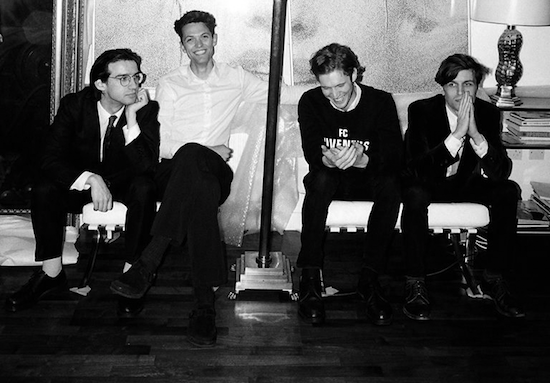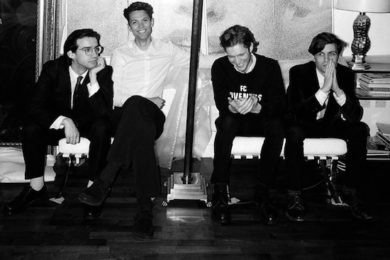Before meeting them, London four-piece Spector are better known to me via their frontman Fred Macpherson’s Never Mind The Buzzcocks appearances than via their first album, Enjoy It While It Lasts. He and his fellow bandmate, Jed Cullen, are undoubtedly camera-friendly. They are eloquent, daft and totally charming despite the fact I openly facepalm at huge swathes of what they say to me. Their all-consuming self-awareness is painful and a product, I assume, of being Londoners with ties to the music industry since they were young, Macpherson both flirting with success in the bands Les Incompétents and Ox.Eagle.Lion.Man and even presenting on MTV2. They are obsessed with formative experiences and whether those of their regional counterparts were more valid than those of teens growing up in the capital. And they are aware that their existence as an anthemic indie rock outfit is somewhat anachronistic: even though their new record, due later this year, takes steps towards a less derivative sound, the hallmarks of mid-noughties chart indie are still present. So, as they approach the release of album number two, we talk a lot about context. And Drake.
The album is still a little while off, what are you up to in the interim?
Fred Macpherson: I think we’re going to be releasing a few singles. Say you had a disastrous party where you cooked for a few friends, but a year later you wanted to have a second party. You’d take it slow with the vol-au-vents. You’d make sure that first you’d have a mini salmon and cream cheese bagel. Then you might have an oriental snack selection from Marks & Spencer. The point is, you’ve got to ease people back into it.
The single, ‘All The Sad Young Men’, is that the the saddest vol-au-vent? What would be in it?
FM: Apparently, salmon is meant to be grey and not pink. So if you saw it in its grey form that would be quite sad. Otherwise it would be a kind of chicken liver thing.
Jed Cullen: One time I ate chicken livers and I vomited black.
But it was still delicious at the time, right? Or are we not doing a metaphor anymore?
FM: No, now we’re just talking about black vomit. It’s a palette cleanser. The sorbet. With ‘All The Sad Young Men’, it’s such a melodramatic, overwrought, portentous song that, well, if you’re okay with that song, you’re going to be able to listen to the rest of the album.
It’s very literary…
FM: I knew it was a good title and obviously F Scott Fitzgerald also thought it was a good title, so we’re on the same level there. I’d heard a song by the jazz singer Anita O’Day called ‘The Ballad Of The Sad Young Men’. A friend of mine had cut together a video on YouTube with that as the audio – photos of our group of friends partying as we grew up in a miserablist, self-indulgent Facebook meme. I thought it was a big name deserving of a big tune.
JC: And then we tried to rein it in a bit.
FM: Some recordings sounded like Coldplay, some like krautrock. But we got there, and I think it’s the first time we felt truly proud ownership over something, that we felt could be our theme tune, if you will.
How did it feel to then give it to a PC Music producer like Danny L Harle?
FM: I was really happy about it. I like how PC Music winds a lot of people up and it’s very production-based. If their inspiration is coming from K-pop and J-pop, and this almost lifeless, CGI music – within that they manage to put across more emotion than half the stuff that’s on the radio.
Who approached who?
JC: We approached him. Even though people might think that the music is annoying, he genuinely enjoys making it. It’s a composition and he’s doing cool stuff. And when you want to remix a song, having something that’s quite simple is a joy.
FM: I think it’s great that he can deliver a version of the song that some people might feel more comfortable with than the melodramatic original. If the remix can be the camouflage for this song to enter people’s minds in a different context then that’s great.
How do you feel about critical opinion? Do you read your own reviews?
FM: Yeah, we do. But I think the path of an artist is that each step is about worrying less about what other people think. I still think we’re trying to become a good band. This isn’t our high-five moment. We can’t sit here and tell you that we’ve made a classic album.
Is classic the aim?
FM: Good is the aim. And good plus context equals classic. We can’t control the context. We can only do our best and maybe at some point the path of culture will cross with ours and we’ll be a bit more relevant than just four English guys.
Context was important with your first album – many felt it sounded like it belonged in 2004. I don’t think it was ever possible for that album to do really well critically because you were reminding reviewers of when they were teenagers, before they became the ‘knowledgeable’ music experts they are today.
FM: I like that theory, but it’s the journalist’s job to theorise about the musician, and not the musician’s job to theorise about what the journalist is thinking.
Fair enough. Then perhaps my question is how do you feel about being associated with that specific period, and why do you think people have found it problematic?
FM: That’s a really good question, but it’s still not our responsibility to worry about how people perceive us. I can see why people would take issue with our first album on the level of context. But, as someone who grew up with that sort of music being the most important thing to me, I felt like we always had an album like that in us. But we’re not an important enough band for it to even be worthy of discussion. Maybe if we ever have the career that David Bowie or The Beatles had, people would be able to look back and agonise. But for now, no one needs to be digging up why our album sounded quite indie rock.
JC: I think it’s also part of the process of being signed. A&R people aren’t kids on the frontline and they are a few years behind. We probably got one of the few deals that could sustain a band in that year.
FM: And to us that album was massively experimental. We’d never succeeded in writing pop songs before. We thought we’d try and write something that would chime on a national scale.
JC: And we pushed for everything we could: gospel singers, string quartets…
FM: We got it all out of our system. When someone says, "Do you want strings?" you say, "Yes!" Is it cliched, and is it cheesy? Yes. That’s not to say that we’re not incredibly proud of it though. We wanted to make banging indie pop songs. Maybe it was a little heavy-handed, but that’s what we wanted to do.
So what’s different about this album?
FM: We spent two years on this album, rather than three months. And we weren’t making it thinking that we were going to take over the world. The artistic ambitions were higher because they were not infected with any commercial ambitions. Not to say we don’t have them, but they’re no longer at the forefront. You always have that wonder on the first one – will we get a No 1, will we be the biggest band of the year?
JC: It’s nice when you’ve got one album out and you know what happens. There’s nothing magical.
FM: And you realise that the opinions of people you respect – your friends, your family, fellow artists – mean much more than a chart placing.
You tweet quite a bit about grime…
FM: It’s something I’ve been listening to since I was a teenager because it’s probably the only genuine underground musical culture that has sustained itself regardless of its commercial crossover. So you’ve had moments of it in the sunshine, but then you have serious artists like Skepta who are making music regardless of where the status quo is at. Labels come and go but they’re still doing it and to me – and this sounds really like a grandad speaking – it’s the closest we’ve had to punk in our era. Only bands like The Cribs have sustained the energy of ‘we’re going to keep doing this whatever people think’. Grime is that ethos.
JC: I think it’s owed more of an accolade. It’s had these pop hits and they know it’s good, and when you have that feeling, you want to keep going with it because you believe in it.
What about Young Money and Drake? What appeals to you so much about those artists?
FM: Drake’s an interesting character because he’s really self-aware and clearly has a massive chip on his shoulder about his legitimacy and how people see him as a former child actor, kind of middle class, son of a Jewish mother. He’s constantly trying to prove himself as ‘the real deal’. The reason I’m a fan of his is that in rap music, through the lyrics, people create more three-dimensional characters. I think people need to be more honest and put a bit more of themselves into the music. Often bands are so plugged into the history of rock, especially in England because we’re fed these BBC Four documentaries on a weekly basis about whoever changed the world. Any ‘rock band’ has been exposed to so much – Uncut magazine, NME, John Lennon, The Who, The Jam – that they feel the need to plug into the cliches of the history of rock.
I feel like that’s why we’ve got such a good influx of American women right now – they don’t hear themselves back in the canon quite so much.
FM: I think that’s right. And there’s that whole machismo thing. That’s why I like Drake – he’s often a pussy. The rock male is such an outdated thing and people still playing that card seem tired. Unless they’re doing it in an ironic way, like Alex Turner.

Speaking of Arctic Monkeys, you’ve gone in for the blatant drugs references on the new record. I’ll be honest, they made me squirm a bit.
JC: We had the same kind of thing. Danny and I spoke about it a lot. But we didn’t want to do a silly poetic way of talking about them, like Game Of Thrones‘ ‘milk of the poppy’.
FM: We’re not glamourising it – we’re just being honestly uncool. I want to grow into being an uncomfortably honest artist because most of my favourites are. The poet Sam Riviere’s stuff is really self-aware, to a pornographic point. The drugs references just feel like the first step on our long path to honesty. I had to sit with my parents and listen to our album. And it was awkward.
Is it an awkward teenager you imagine, while you’re listening?
FM: Just English people growing up. The protagonist in our music isn’t the hero. We want to talk about the banal. There’s a song called ‘Stay High’ on the album and the whole thing is about the constants of modern dating, like Orange Wednesdays. England’s going through the realisation that it’s not a glamorous or cool place to live.
How do you tally that with the fact that a lot of your listeners will see you as being in the middle of a glamorous lifestyle in east London?
FM: Well, some of us live in west London! But I can confidently tell you that east London is the least cool bit of the UK right now. We’re not seeing or experiencing anything better. It’s a place where people look to see if stuff works, but it’s less noble and it’s less pure.
How important is the notion of purity?
FM: I can’t speak for the generation as a whole, but I can speak for the 30 people I know and regularly speak to. We are a generation made cynical in our teens. Traditionally you were born wide-eyed and had it all to play for, but now, you’re born and made cynical by uninspirational places like what London is becoming, and you spend the rest of your life trying to find the purity and the honesty.
It sounds like you reckon that honesty is to be found in hip hop.
FM: I feel like in hip hop people reference modern technology more, whereas I feel like there’s a rule in guitar music that you’re not allowed to. Even when people say the word ‘text’ it seems heavy-handed. So with our album, there are references throughout to phones and the internet. We’re not writing about technology, in the same way I don’t think we’re writing about love, but that’s the context and that’s the medium. Love stories are the way we’re putting across where things are at. Whether that’ll resonate with anyone remains to be seen.
Spector’s as-yet-untitled second album is out later this year via Fiction. Spector play the following dates:
APRIL
Thu 16 – 100 Club, London
MAY
Sat 2 – Live At Leeds, Leeds
JUNE
Sat 6 – Field Day, Victoria Park, London




